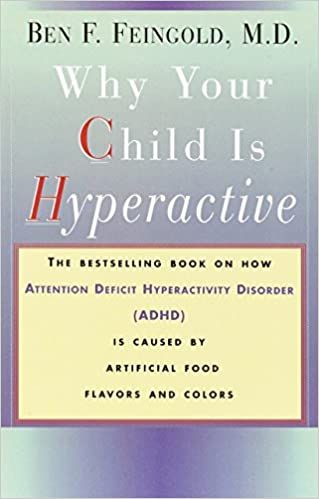
Why Your Child is Hyperactive
This book, written by practicing pediatrician and allergist Dr. Ben Feingold, contains sound research and medical advice about how artificial food coloring and flavoring is often the culprit of hyperactivity in children. From this book, the widely renowned “Feingold diet” was derived. And 36 years after it was first published, there are still many parents overflowing with gratitude for the positive effects the book’s diet recommendations have had on their children. In fact, the book is considered by many to be even more relevant today, since there are much more artificial ingredients in foods that make up a large part of peoples’ everyday diets.
While the advice in the book is laid out with simple and clear instructions, these changes are difficult to make, but as many parents have reported, the results make it all worth it. In Stage One of the Feingold Diet, synthetic flavors, preservatives, and artificial sweeteners are removed from the diet, along with salicylates such as aspirin. Dr. Feingold’s research has found many of these products trigger hyperactivity in children. In Stage Two of the Feingold Diet, some of the products removed in Stage One are slowly reintroduced and closely monitored to see if they have an adverse effects on the child’s behavior. With the Feingold Diet, it is important that parents keep a journal of what products have been removed from their child’s regimen and which products have been reintroduced.
The benefits of the work that goes into the Feingold Diet is that it’s all natural and will likely remove products that were never good for your child (or yourself if you choose to follow the diet). And Feingold recommends that if parents are able to see positive results from the diet, they should consider talking to their child’s psychiatrist about taking them off any medications they have been put on for ADD or ADHD. This should only be done under the supervision of a mental health professional, since many drugs prescribed for ADHD are forms of speed and can be dangerous to withdraw from too quickly. Why put any drug into your child’s body that they may not need and that can cause adverse side effects? The Feingold Diet may be the answer to your child’s behavioral issues that you have been waiting for. And it could be a program that parents themselves, along with the rest of the family, may also want to follow and reap the long-term benefits.
About the Author
Dr. Ben Feingold is a pediatric allergist who taught pediatrics at Northwestern University Medical School in Chicago, and then moved to Los Angeles where he practiced pediatrics for 22 years. While in Los Angeles, Dr. Feingold served as chief of pediatrics at Cedars of Lebanon Hospital, was an associate in allergy at the Los Angeles Children’s Hospital, and an attending pediatrician at the Los Angeles County Hospital. His research has been a source of controversy and heavy discussion among certain bodies in government. But much of his research has been of much interest to the U.S. Senate and State of California. Dr. Feingold can be thanked for the removal of certain harmful substances from our food supply, as well as the increased safety in food production around the world.
Feingold’s research led to more research done by others, which suggested in 1980 that artificial food dyes might indeed adversely affect the behavior of children. In 1951, Dr. Feingold married his wife, Helene. Together, they wrote The Feingold Cookbook for Hyperactive Children, which was published in 1979, four years after Why Your Child is Hyperactive.
Dr. Feingold was born in Pittsburgh in 1900 and did his undergraduate and medical work at the University of Pittsburgh. He was an intern at Passavant Hospital in Pittsburgh, and then went on to serve as a fellow in pathology at the University of Gottingen in Germany in 1927, followed by a fellowship at the children’s clinic at the University of Vienna from 1928-1929.
Though Feingold is gone, the Feingold Foundation continues his valuable work and research, and you can find more information on their website.
Children's Health, hyperactivity, Mental Health, natural remedies, Psychiatry

